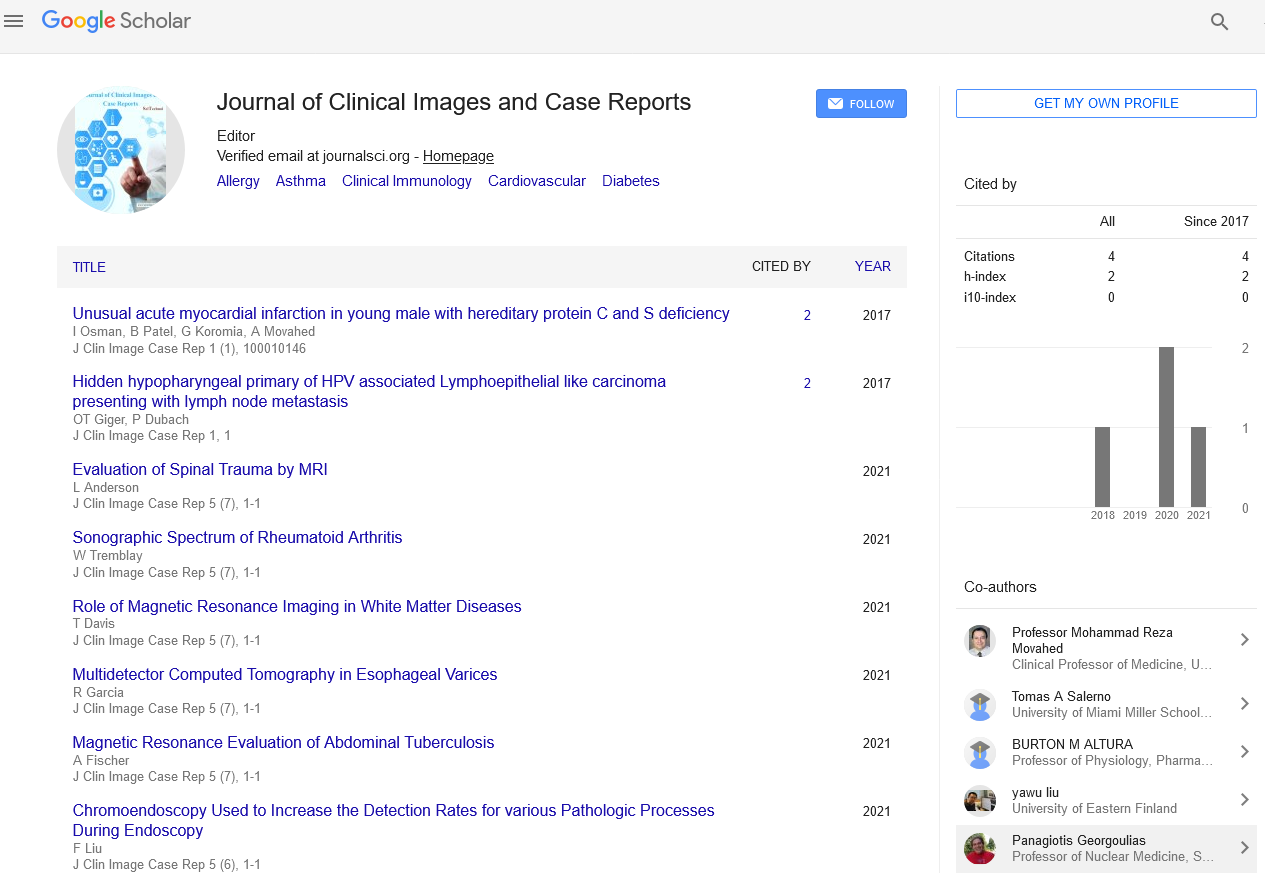Commentary, J Clin Image Case Rep Vol: 8 Issue: 4
Dietary Interventions in the Management of Inflammatory Bowel Disease
Zhihao Stinson*
1Department of Nutrition and Food Science, University of Maryland, College Park, USA
*Corresponding Author: Zhihao Stinson,
Department of Nutrition and Food Science,
University of Maryland, College Park, USA
E-mail: stinsonzhihao@gmail.com
Received date: 22 July, 2024, Manuscript No. CICR-24-150616;
Editor assigned date: 24 July, 2024, PreQC No. CICR-24-150616 (PQ);
Reviewed date: 07 August, 2024, QC No. CICR-24-150616;
Revised date: 14 August, 2024, Manuscript No. CICR-24-150616 (R);
Published date: 21 August, 2024, DOI: 10.4172/CICR.1000319
Citation: Stinson Z (2024) Dietary Interventions in the Management of Inflammatory Bowel Disease. J Clin Image Case Rep 8:4.
Description
Inflammatory Bowel Disease (IBD), which includes conditions such as Crohn’s disease and ulcerative colitis, is a chronic inflammatory disorder of the gastrointestinal tract. The management of IBD is multifaceted, involving medications, lifestyle changes and dietary interventions. While pharmacological treatments aim to reduce inflammation and induce remission, dietary modifications can play an important role in managing symptoms, enhancing quality of life and potentially influencing disease outcomes. This article examine the significance of dietary interventions in the management of IBD, focusing on personalized nutrition and specific dietary strategies.
Personalized nutrition
Personalized nutrition is an approach that recognizes the unique dietary needs and tolerances of individuals with IBD. Since the condition can vary significantly from one person to another, what works for one patient may not be effective for another. A thorough assessment of individual dietary habits, symptom patterns and nutritional deficiencies is essential to formulate an effective dietary plan.
Research has shown that certain foods can exacerbate IBD symptoms, while others may help alleviate them. For instance, many patients report sensitivity to high-fiber foods, dairy products and fatty or spicy foods, which can lead to increased symptoms like diarrhea and abdominal pain. As such, a personalized elimination diet can be beneficial, allowing individuals to identify specific food triggers. Once trigger foods are eliminated, a gradual reintroduction can help determine tolerable options, developing a more comfortable and manageable dietary routine.
Moreover, certain nutrients may be particularly beneficial in managing IBD symptoms. Omega-3 fatty acids, found in fish oil and flaxseeds, have anti-inflammatory properties that may help reduce inflammation in the gut. Similarly, probiotics and prebiotics, which promote gut health, can also play a role in managing IBD. Foods rich in probiotics, such as yogurt and fermented products, can help restore the gut microbiota balance, potentially improving symptoms and promoting remission.
Collaboration with a registered dietitian familiar with IBD can provide patients with the necessary support and guidance in developing a personalized nutrition plan. These professionals can assist in ensuring that individuals receive adequate nutrition while managing their symptoms, helping to prevent malnutrition, which is a common concern for many IBD patients.
Specific dietary strategies to alleviate symptoms
In addition to personalized nutrition, several dietary strategies can help alleviate symptoms and improve the overall well-being of individuals with IBD. A low-residue diet is one such approach, often recommended during flare-ups. This diet minimizes the intake of fiber and certain carbohydrates to reduce bowel movements and irritation of the digestive tract. Foods included in a low-residue diet are white bread, rice, pasta and well-cooked vegetables. While this diet is typically temporary, it can provide significant relief during acute symptoms.
Another dietary intervention is the use of a Mediterranean diet, which emphasizes fruits, vegetables, whole grains, lean proteins and healthy fats, particularly olive oil. This diet is rich in antioxidants and anti-inflammatory compounds, making it beneficial for managing inflammation associated with IBD. Studies have suggested that adherence to a Mediterranean diet may lead to improved clinical outcomes in IBD patients, including reduced disease activity and improved quality of life.
Furthermore, some patients may find relief through the implementation of specific dietary supplements. For example, vitamin D has been studied for its role in modulating the immune response and its potential benefits in IBD management. Omega-3 supplements may also be considered for their anti-inflammatory effects. However, it is important for individuals to consult healthcare professionals before starting any supplementation, as some may interact with existing medications or may not be appropriate based on individual health conditions.
It is also important to emphasize the role of hydration in managing IBD. Many individuals with IBD experience diarrhea, which can lead to dehydration and electrolyte imbalances. Drinking plenty of fluids, such as water and electrolyte-rich beverages, is vital, especially during flare-ups. Maintaining hydration can help improve overall well-being and support digestive health.
Dietary interventions play a significant role in the management of Inflammatory Bowel Disease. Personalized nutrition allows for tailored dietary strategies that address individual needs and symptoms, while specific dietary approaches, such as low-residue and Mediterranean diets, can help alleviate discomfort and promote overall health. By incorporating these dietary interventions into a comprehensive treatment plan, individuals with IBD can enhance their quality of life and better manage their condition. As ongoing research continues to shed light on the relationship between diet and IBD, the importance of individualized dietary strategies will only grow in significance.
 Spanish
Spanish  Chinese
Chinese  Russian
Russian  German
German  French
French  Japanese
Japanese  Portuguese
Portuguese  Hindi
Hindi 